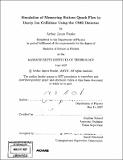Simulation of measuring bottom quark flow in heavy ion collisions using the CMS detector
Author(s)
Franke, Arthur James
DownloadFull printable version (2.810Mb)
Other Contributors
Massachusetts Institute of Technology. Dept. of Physics.
Advisor
Gunther Roland.
Terms of use
Metadata
Show full item recordAbstract
In this thesis, I carried out a simulation study to characterize the measurement of bottom quark flow in relativistic Pb+Pb collisions using the Compact Muon Solenoid experiment. The Hydjet event generator is used to produce sample collision events at four centrality values between 0 and 12 fm. These events are processed using the simulation, digitization, and reconstruction modules of the CMSSW software framework. Studies of these data produce information necessary to create a flow signal simulator, and attempts are made at suggesting values for experimental cuts in PT and DCA to reduce backgrounds. Using the signal simulator, it is determined that the muon elliptic flow coefficient, v [mu]/2, varies linearly with that of open beauty, v B/2, with the same constant of proportionality applicable in all background conditions. The expected statistical uncertainty of the flow measurement, RMSv2, is shown to vary linearly with background level. Finally, RMSv2 is shown to vary with event sample size as predicted by background-to-signal ratio counting statistics.
Description
Thesis (S.B.)--Massachusetts Institute of Technology, Dept. of Physics, 2007. Includes bibliographical references (leaves 55-59).
Date issued
2007Department
Massachusetts Institute of Technology. Department of PhysicsPublisher
Massachusetts Institute of Technology
Keywords
Physics.